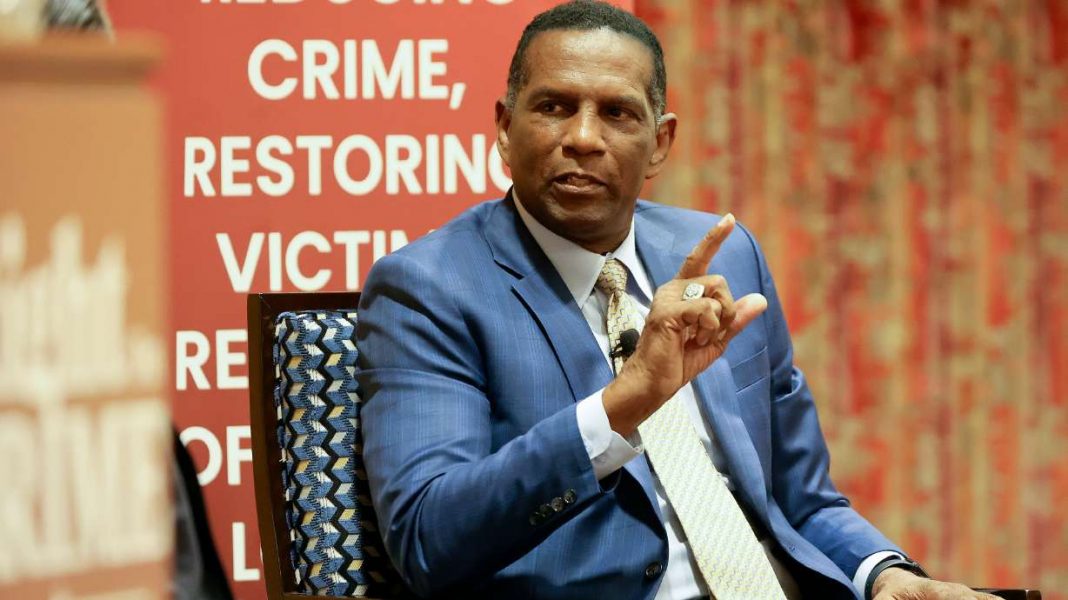WASHINGTON — In a House hearing on Thursday morning, Rep. Burgess Owens, a Republican from Utah, likened diversity, equity, and inclusion (DEI) initiatives to ”a deeply-rooted malignancy within the heart of American academia.”
The hearing, dubbed “Polarizing, Excessive, Ineffective: The True Consequences of DEI on University Campuses,” was chaired by Owens, who also heads the House Subcommittee on Higher Education and Workforce Development. The discussion revolved around the effects of DEI initiatives on medical institutions and the issue of antisemitism in universities.
In his introductory remarks, Owens expressed his belief that these initiatives foster a ”distorted perspective” of America, portraying the nation as “a hierarchy built on racial oppressors and the racially oppressed.”
This congressional hearing follows closely on the heels of the Utah Legislature’s decision to revamp DEI initiatives in public institutions, encompassing universities, schools, and other state entities.
The newly enacted law, signed by Utah Gov. Spencer Cox on Jan. 30, mandates training for university employees on the importance of free speech and the conduction of climate surveys, the findings of which must be disclosed to lawmakers. The state reserves the right to withhold funding if institutions fail to comply with these requirements.
At the congressional hearing in Washington, Owens, who represents Utah’s 4th District, stated, “DEI bureaucrats are employed not merely to regulate conversations but also to suppress free speech and open dialogue by exerting influence over every aspect of university administration, personnel, curriculum policy, and college admissions.”
Partisan Disagreement over the Purpose of the Program
Owens argued that these programs encourage Black Americans to view their race as “feeble” and to “anticipate the promise of slavery reparations.” He further stated that DEI initiatives suggest that Black Americans, like himself, who demonstrate the determination and resilience to succeed, are outliers rather than the norm.
“DEI is both belittling and racist,” Owens declared, citing the silencing of scholars who dare to challenge it.
Owens highlighted the financial burden of DEI initiatives across the nation: $30 million annually at the University of Michigan, $20 million at Ohio State, $16 million at the University of Western Wisconsin, and $11 million at Texas A&M.
“What is the outcome?” Owens queried. “More hatred? More resentment? And more racism?“
Ranking chairwoman Suzanne Bonamici, a Democrat from Oregon, countered Owens’ comparison of DEI initiatives to cancer, which she found “perplexing and quite offensive to anyone who has battled cancer.” In response, Owens, a cancer survivor himself, stood by his initial statement.
Bonamici argued that DEI offices strive to provide support and identify obstacles in the education system to cater to “the needs of increasingly diverse populations, many of whom are first-generation college students.”
“Unfortunately, some Republican-led state legislatures have deemed DEI offices as too expensive,” she noted.
Bonamici suggested that universities where DEI initiatives are falling short should be encouraged to improve, rather than being outrightly condemned.
The Influence of DEI Initiatives in Medical Schools
Prior to questioning the witnesses, Owens mentioned an article he read about Columbia University facing criticism for a 2021 viral video in which students recited a modified version of the Hippocratic oath during a white coat ceremony.
The altered oath included phrases such as “We also acknowledge the acts and systems of oppression perpetrated in the name of medicine,” and “We take this oath of service to commence building a future rooted in truth, restoration, and equity to realize medicine’s potential to liberate.”
Owens asked witness Dr. Stanley Goldfarb, the chairman of Do No Harm, a medical association opposing liberal ideology, whether the original oath mentions “systems of oppression in medicine.” Goldfard confirmed that the original oath did not contain any such statements. When Owens inquired whether the purpose of medicine is to liberate, Goldfard, once again, responded with a “no.”
“Doctors must retain a wealth of information, sift through it, comprehend human variability, and apply it to individual patients,” Goldfard explained. “That’s why I firmly believe that academic achievement should be the primary criterion for admission into medical school.”
“I think we can all agree that this is one profession where meritocracy should be the primary focus,” Owens concurred.
DEI Initiatives and Antisemitism in Universities
Owens then directed his next question to Jay Greene, a senior research fellow at The Heritage Foundation’s Center for Education Policy, about the impact of DEI initiatives on the Jewish community.
In his opening statement, Greene stated that instances of antisemitism in universities are not isolated incidents. In his analysis of X accounts of university DEI staff, Greene found evidence of “vehement hostility toward” Israel. He noted that these staff members posted “three times as often about Israel as they do about China.” The language used to express this animosity includes terms like “apartheid, colonialism, genocide, and ethnic cleansing.”
Owens then turned to witness Erec Smith, an associate professor of rhetoric at York College of Pennsylvania and a CATO research fellow, asking him to elaborate on his statements about DEI initiatives being “subtly anti-Black,” and how he was labeled a “white supremacist” for opposing these initiatives as a Black academic.
In his opening statement, Smith mentioned prescriptive racism, which assigns “certain values, attitudes, and behaviors to someone based on their race,” as a component of social justice reform.
He cited instances of professors allowing and encouraging Black students to write in African American vernacular, also known as Ebonics. When students refused to abandon standardized English, these professors perceived it “as a form of self-hatred and internalized racism,” Smith explained.
“Teaching standardized English is not inherently racist,” he assured Owens.




Agree. Owens’ divisive rhetoric only undermines efforts to create a more inclusive and equitable learning environment for all students.
BjbtdTaCsxRcUQrK